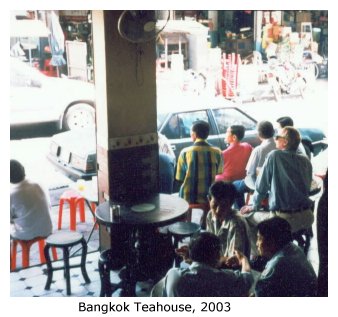

|
| weblog/wEssays archives | home | |
|
Will Thailand Lead the Global Economy Down--Again? (January 4, 2007)  Some chartists discern 10-year and 20-year cycles in markets. Thailand's decline into
instability and currency controls 10 years after its meltdown in 1997 should raise alarms.
Some chartists discern 10-year and 20-year cycles in markets. Thailand's decline into
instability and currency controls 10 years after its meltdown in 1997 should raise alarms.
(That's me on the far right of this photo, in shades and a long-sleeve shirt. This teahouse--one of Bangkok's few remaining old-style teahouses--is on the edge of the city's Chinatown district, one of many streets where farangs (foreigners) are few and far between.) I am not the first to note the 10-year period from Thailand's devaluation of the baht from a fixed rate of 25 to the dollar to a floating rate, nor the first to wonder if the inverted yield curve and the decline in the dollar is setting up a replay of 1987, when the Dow Jones Industrials dropped 22% in one day before recovering later that year. But let's first consider Thailand. I have much affection for Thailand as a nation and as a people, and the current wave of instability worries me. We have many Thai friends, so the effects of a crisis would not be impersonal. Thailand's political and financial instability is a non-trivial matter. It's easy to sound glib about 1997 - 2007 comparisons, but the political devolution to a bloodless coup and future elections is, while not unknown in Thailand, not a harbinger of certainty. Few farangs understand the critical position of the Thai King Bhumibol in the political and cultural milieu of modern Thailand. He is revered and respected, at least in part because he has entered the political arena only rarely, and only at pivotal moments. The King is now 80, and it is certainly a lot to ask of any monarch of that age to shepherd his people through yet another political and financial crisis. The Royal Couple have a son, but he has not gained the respect of the Thai people; their daughter is universally loved, but the rules of accession call for the son to take the throne on his father's passing. Though few speak openly of such a delicate topic, many fear this transition will not be welcome. Should crisis come and the King is unable to provide the guidance which has mitigated previous crises, then Thailand will be in uncharted waters for the first time since the King took the throne 60 years ago. The Thais maintain a relatively peaceful and orderly society, and just about the only way a farang can get beaten up is to insult the King. (With whom I share a birthday, by the way.) Nine bombs detonating in Bangkok is non-trivial, despite being reported on page B-13 here in the States. Ask yourself how we would respond if nine timed bombs went off in New York or Washington D.C. Now ask how blase we are when it happened in Thailand. For the Muslim rebellion (or whatever you wish to call it) to strike Bangkok, things are getting serious. The underlying causes of the "Asian Contagion" of 1997-98 are many, but one was the gargantuan and virtually unlimited flow of foreign capital in and out of Asian countries. It is a cliche to observe that in today's electronic world, billions of dollars can enter or exit an economy in a few mouse-clicks. The distortions created by this astoundingly vast capital flitting around the globe seeking a "return on investment" for this quarter, this month, this week, today, or even this hour are very real. I have been warning here for some time that even an economy the size of China is not immune to the ebb of foreign capital, for it is an economy heavily dependent on foreign investment. China has been riding an unprecedented wave of foreign investment, totalling into the hundreds of billions of dollars. Once the music stops and the easy money can no longer be made, that capital will vanish with breathtaking speed. Smaller countries such as Thailand are vulnerable to being whipsawed by such movements of capital, and to breezily state that "markets will take care of themselves" is to fail to grasp the impact of currency and capital flows in what are essentially small, thinly capitalized economies. Does Thailand's instability presage another global financial meltdown? No one knows, but the instability is real, and bears watching. For more on this subject and a wide array of other topics, please visit my weblog. copyright © 2007 Charles Hugh Smith. All rights reserved in all media. I would be honored if you linked this wEssay to your site, or printed a copy for your own use. |
||
| weblog/wEssays | home |